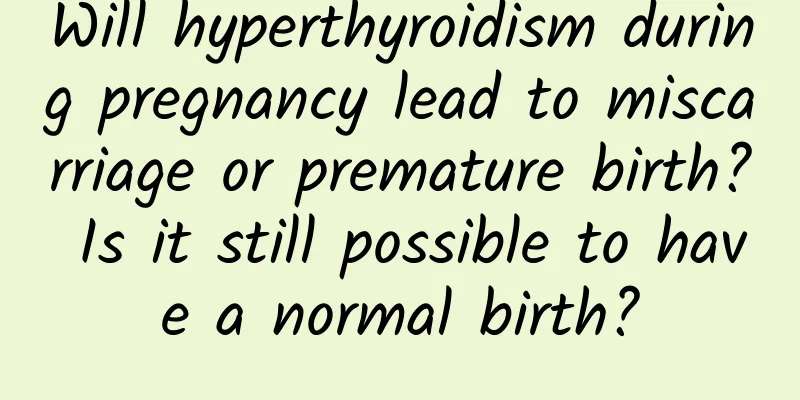Will hyperthyroidism during pregnancy lead to miscarriage or premature birth? Is it still possible to have a normal birth?

|
Author: Xiao Jianzhong, Chief Physician of Beijing Tsinghua Chang Gung Hospital affiliated to Tsinghua University Reviewer: Wu Xueyan, Chief Physician, Peking Union Medical College Hospital Every pregnant mother hopes that she can give birth to a healthy baby smoothly. However, pregnancy is a big challenge for every pregnant mother. Not only will there be various physical discomforts, but she may also be troubled by various pregnancy complications, such as hyperthyroidism during pregnancy. Next, let us learn about the common problems related to hyperthyroidism during pregnancy. First of all, we need to pay great attention to hyperthyroidism during pregnancy, because hyperthyroidism itself has an impact on the cardiovascular system, metabolism, and fetal development. If it is not actively controlled, the probability of miscarriage and premature birth is relatively high. In addition, the most common type of hyperthyroidism is Graves' hyperthyroidism, which contains an antibody called TRAb antibody. This antibody can pass through the placental barrier into the fetus and stimulate fetal thyroid hyperplasia, which may cause neonatal hyperthyroidism. Even during pregnancy, fetal thyroid enlargement can be found. Figure 1 Original copyright image, no permission to reprint So for a pregnant woman with hyperthyroidism: First, a detailed examination is needed to determine the type of hyperthyroidism, whether it is Graves' hyperthyroidism, transient increase in thyroid hormone, or hyperthyroidism caused by other reasons. Second, we must take proactive measures, choose appropriate medications for treatment according to the pregnancy period, and then closely monitor changes in thyroid function and adjust anti-thyroid drugs in a timely manner based on functional changes. Third, if some emergency situations occur, we must actively deal with the corresponding problems. Some friends may also ask, if you have hyperthyroidism during pregnancy, can you still give birth naturally? If hyperthyroidism is well controlled, the patient can give birth like a normal person. If the conditions for a normal birth are met, a normal birth can be performed. However, if hyperthyroidism is not well controlled, the delivery process will be a stress response, which may cause hyperthyroid crisis and very serious conditions, making natural delivery unsuitable. Therefore, whether or not you can have a normal birth depends very much on the control of your thyroid function. If you have been receiving standardized treatment and your thyroid function is well controlled, the probability of a hyperthyroid crisis is very low, and you can have a normal birth. If the due date has arrived and the woman comes to the doctor with symptoms of hyperthyroidism crisis, it is very important to control the hyperthyroidism crisis and then perform a cesarean section in time to terminate the pregnancy. So, for women who have hyperthyroidism during pregnancy, can they stop taking medication immediately after delivery? The answer is no. Because the immune response related to hyperthyroidism is suppressed during pregnancy, hyperthyroidism is easy to control. However, after delivery, this situation will become uncontrolled, so within one year after delivery, autoimmune thyroid disease is prone to recurrence or aggravation, so you cannot stop taking the medicine after delivery, and you must continue to observe the condition. Figure 2 Original copyright image, no permission to reprint Many friends will ask, when can I stop taking the medicine? Hyperthyroidism treatment has a course of treatment. It is not difficult to control hyperthyroidism with medication, but the difficult part is how to reduce recurrence. So we have a few suggestions: The first is a long enough course of treatment. The treatment of hyperthyroidism requires at least one year. No matter how small the dose of the medicine is, it is best to maintain the treatment for more than one year. The second is that the maintenance dose should be small enough. For example, you can take three tablets a day at the beginning, and in the end, you may only need to take half a tablet every other day to maintain it. If you maintain this for two or three months, the thyroid function will be quite normal. This is called a low enough dose. The third one is TRAb antibody, which means the thyroid stimulating hormone receptor antibody turns negative. If these three conditions are met, you can consider stopping the medication. Another thing we need to remind everyone is that for women who have a history of hyperthyroidism during pregnancy, if they want to get pregnant again, it is best to check their thyroid function to see if the thyroid hormone level is normal. They should also check TRAb antibodies because it is the root cause of the disease. If there is a problem with TRAb antibodies, special attention should be paid, as there may be a risk of recurrence if they get pregnant again. |
<<: How to diagnose hypothyroidism during pregnancy? Should I take iodine supplements?
>>: Behind hemoptysis, there may be "early warning signs" of these diseases
Recommend
25 weeks pregnant
As we all know, pregnancy is the most difficult a...
Symptoms of blood deficiency and wind dryness in women
Blood deficiency and wind-dryness come from the t...
What should women do if they have bad skin? You will be more beautiful by doing this!
Every woman wants to have very good skin. Good sk...
Rapid treatment method for female anal prolapse
Female rectal prolapse is a common anorectal dise...
Two consecutive abortions
After an abortion, women generally need to rest f...
A girl with poor physical strength runs 800 meters
It will be quite difficult for girls with poor ph...
Which is more painful, clamping or induction of labor?
After becoming pregnant, women may be affected by...
What is the reason for the odor in the lower body after sex?
Many women have an unpleasant odor in their lower...
Is it a boy or a girl if estrogen is high during pregnancy
Is it a boy or a girl if estrogen levels are high...
What is the best ointment for removing pubic lice?
When it comes to parasites, I believe everyone is...
What is CPB water grinding essence? What are the effects of CPB water grinding essence?
CPB Water-Moisturizing Beauty Serum is also calle...
Is it good to eat green mango during menstruation?
We all know that women's bodies are very frag...
What to do if you keep bleeding during pregnancy
Pregnancy has a great impact on women's bodie...
Massage techniques to clear breast nodules
In recent years, female breast diseases have show...
Can you play with your phone safely by turning on the “eye protection mode”?
now Whether it is work or life All kinds of elect...









